Post Brexit Transition Period:
An impact analysis on businesses based in the West Midlands Combined Authority Area







The quantitative and qualitative feedback that the Chambers received via a survey shared with over five thousand businesses identified a number of key areas that are impacting the business community:
•47% of local businesses have found it more difficult importing goods from the EU since 1st January
•34% of local businesses have found it more difficult exporting goods to the EU since the 1st January
•40% of respondents had experienced increased costs and 28% have experienced border delays as a result of the UK’s departure from the EU
•35% of small and micro sized businesses lack the capacity to deal with the additional documentation requirements for trading with the EU
•20% of local businesses have incurred higher costs and passed them onto customers in order to address the issues that have arisen as a result of the UK’s departure from the European Union
•60% of businesses plan to maintain existing activity levels with the EU in the short term (0-2 years) compared to 50% of businesses in the long term (2 to 5 years)
We have set out below some of the measures we would like the government to adopt at this early stage to help businesses as they adjust to the UK’s new trading position with the EU.
•Introduce a modified form of the SME Brexit Support Fund to support those smaller firms struggling with additional upfront costs
•Support those operating in the cultural sector that fall outside the parameters of the Global Talent Visa in order to travel and work in the European Union
•Agree mutual recognition arrangements for Sanitary and Phytosanitary (SPS) measures in order to minimise the additional administrative burdens that firms are facing
•Use the extension of the easement period for CE Markings to tackle ongoing issues such as automotive businesses facing additional costs as a result of having to duplicate markings on certain components
•Seek further labour flexibility through additional agreements on services access and ability of workers to take up roles in both markets - particularly seen in terms of haulage and hospitality
This report provides insight into and intelligence on the impact the end of the Brexit transition period has had on businesses from across the West Midlands Combined Authority area. It analyses data collected via the Chambers of Commerce (Greater Birmingham, Coventry & Warwickshire and Black Country Chambers) Quarterly Economic Survey as part of the project work which the three Chambers are currently undertaking in partnership with the West Midlands Combined Authority (WMCA). This report looks at how the EU-UK Trade & Cooperation Agreement has affected West Midlands business’s ability to trade with the EU. It assesses how the end of the transition period has impacted on regional firms’ ability to import goods from and export goods & services to the EU. It will also assess how local businesses have been impacted by the new trading arrangements with Northern Ireland and the extent to which they have found it difficult recruiting EU citizens. The survey questions also consider the main issues that businesses have encountered and how they have attempted to address them as well as their future intentions when it comes to trading with the EU market.
716 businesses from across the three Chambers completed the survey which ran from the 17 May -16 June 2021. 79% of the respondents were services sector firms compared to 21% who identified as manufacturers. 48% of the businesses surveyed were micro businesses; 33% were small businesses; 14% were medium sized firms; 5% were large businesses. Micro businesses are underrepresented in this survey as they represent 88.9% of the local business population. Small businesses make up 8.9% of the West Midlands Metropolitan area business community with medium sized enterprises and large enterprises representing 1.7% and 0.5% respectively.
This report explores five key areas:
•The impact of Brexit and the ease of doing business for local firms with the EU
•The issues that firms encountered as a result of the UK’s departure from the European Union
•The actions that businesses have taken in order to address the potential issues that have arisen as a result of the UK’s departure from the European Union
•Future activity for local firms operating in European Markets
•How businesses are responding to the end of the Brexit transition period
Businesses were asked about the extent to which the new trading arrangements had impacted their ability to:
•Import goods from the EU
•Export goods to the EU
•Move goods between the UK and Northern Ireland
•Provide Services in the EU
•Recruiting workers from the EU
What impact, if any, has the end of the UK’s Transition period with the EU (Brexit) had on the ease with which your business can do the following?
53% of the firms surveyed reported that the end of the Brexit transition period had no impact on their businesses ability to import goods from the EU. A similar proportion of firms had found it more difficult importing goods from the EU since the 1 January with 24% of businesses finding it significantly more difficult compared to 23% whom had found it slightly more difficult. Only one of the businesses surveyed reported that they had found it slightly easier importing goods under the new trading arrangements.
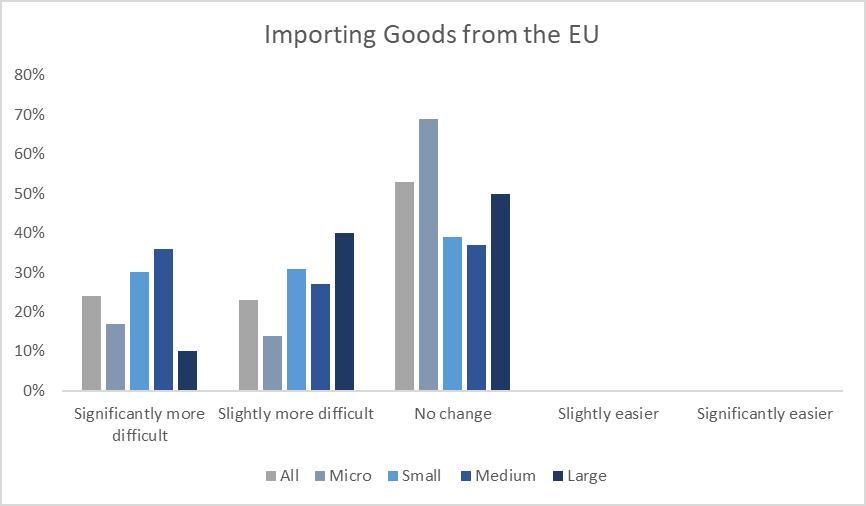
“Our main impact has been delays of incoming goods at the border, and increase in cost of imported goods. These goods could easily be routed via alternate non-EU countries, and it would be helpful if the Government facilitated easing these alternate routes.”
66% of respondents reported that there had been no impact on their ability to export goods to the EU following the end of the Brexit transition period. Nearly 1 in 5 (19%) answered that it had become significantly more difficult following the rule changes at the start of the year with 15% answering that it had become slightly more difficult.
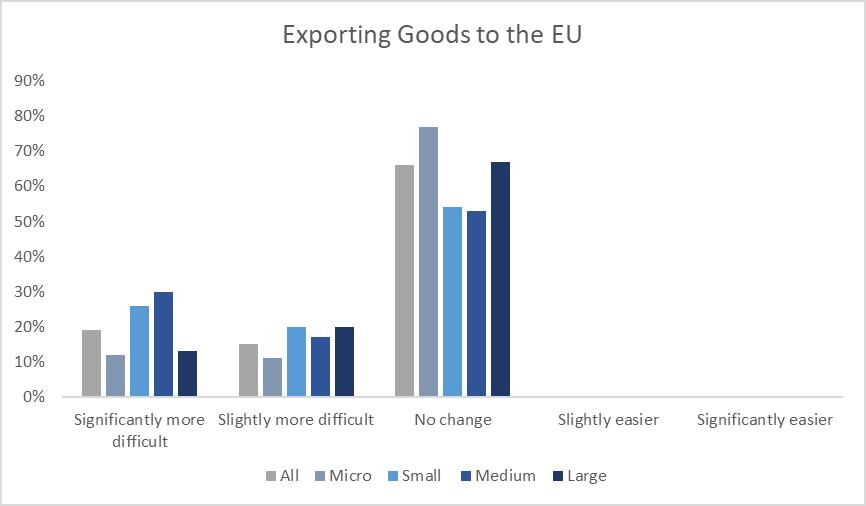
69% of businesses answered that the end of the transition period had not impacted their ability to move goods between the UK and Northern Ireland. 18% of the businesses surveyed said that it had become significantly more difficult moving goods across the Irish sea border with 13% finding it slightly more difficult since the end of the transition period.
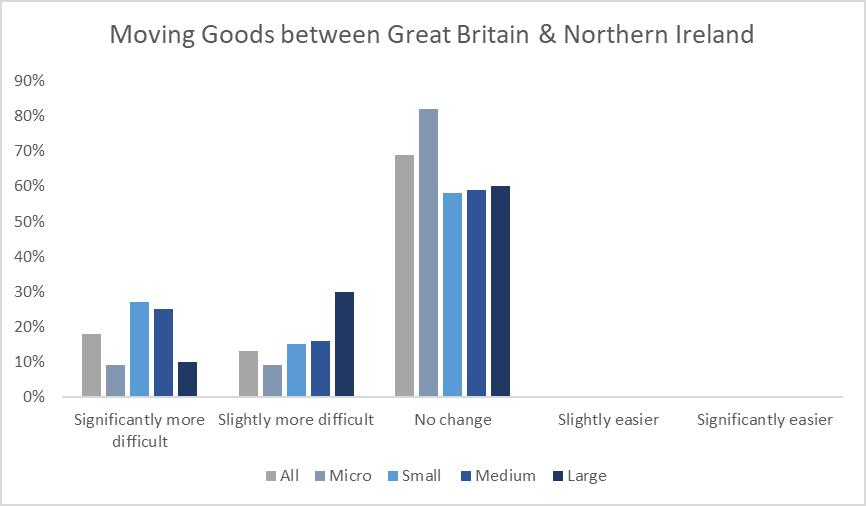
“We have managed to alter our processes to be able to deal with the E.U. (although this has been difficult, time consuming, bureaucratic and expensive). Sending goods to N.I. has been more problematic”
67% of businesses answered that the end of the transition period had not impacted their ability to deliver services in the EU. 16% of respondents had found it significantly more difficult providing services in the EU and 16% had found it slightly more difficult. Only 3 of the firms surveyed had reported that it was slightly easier to provide services in the EU following the end of the Brexit transition period.

More than two in three of the businesses surveyed (71%) had experienced no change in the ease of which they have been able to recruit workers from the EU following the end of the Brexit transition period. 16% of firms had found it significantly more difficult trying to recruit workers from the EU with 13% finding it slightly more difficult.
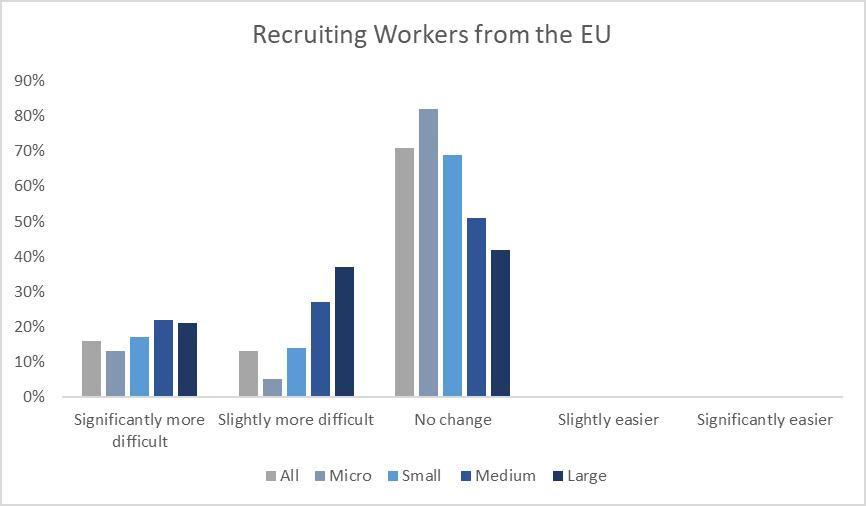
“More than 50% of our workforce are EU nationals, we have seen a decline in new applicants coming in and have also lost some key staff who have returned back to their place of birth. We have also seen an increase in the price of steel, which is one of the main materials used within the business.”
Businesses were asked what issues (if any) they had faced as a result of the UK’s departure from the EU. The overall results were as follows:
• 40% of respondents had experienced increased costs
• 18% answered that there was a lack of capacity within their organisation to deal with the new documentation requirements for trading with the EU
• 16% reported that had experienced reduced demand from EU businesses for their products and services
• 12% of the businesses surveyed had lost out on business to EU competitors
• More than a quarter, 28%, had experienced border delays
• 17% of respondents reported a lack of availability in the haulage sector to transport goods between the EU and UK
• 18% reported that their EU customers did not understand the new requirements for trading with the UK
• 9% of businesses had experienced difficulty recruiting EU citizens
• 14% of the firms surveyed had encountered no issues at all
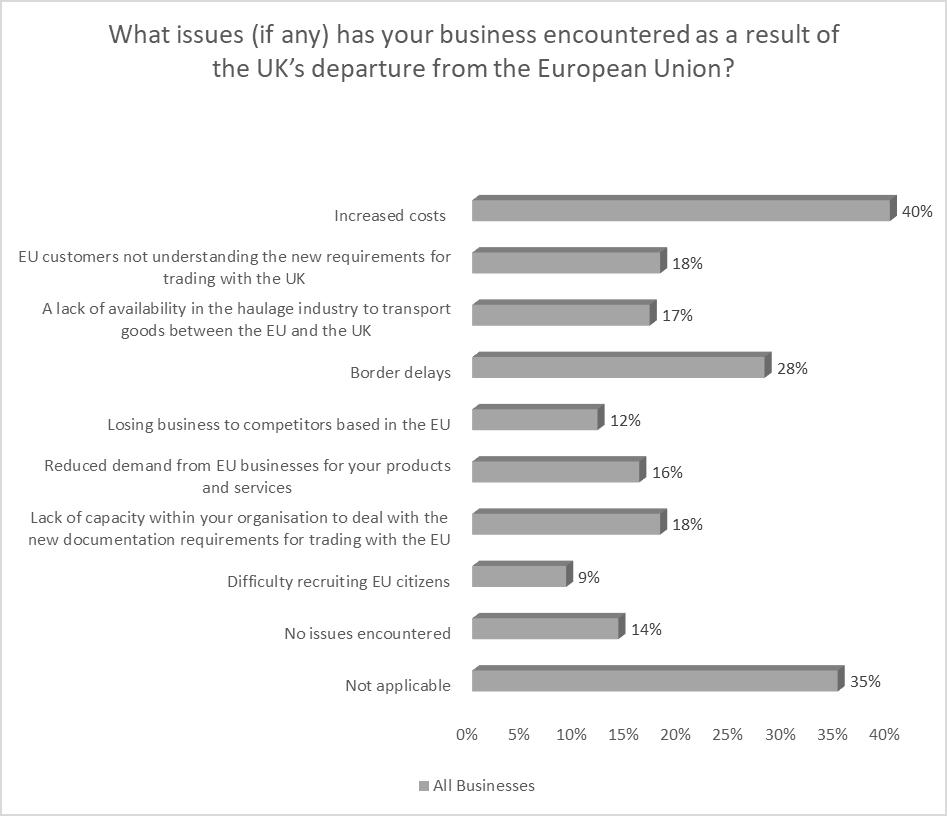
• More than a third, 35%, of firms answered ‘not applicable’
Unsurprisingly, when looking at the industry split, manufacturers have been more severely impacted than services industry firms in each of these areas aside from difficulty recruiting EU citizens.
2.What issues have firms encountered?
One in ten services sector firms had experienced difficulty recruiting EU citizens following the UK’s exit from the EU compared to 6% of manufacturers.
A significantly higher proportion of manufacturing firms had encountered increased costs following the UK’s departure from the EU than services firms. Nearly four in five manufacturers (76%) cited increased costs; contrasting sharply with the 30% of services sector firms that had seen their costs increase.
Since the UK left the EU, businesses have faced increasing costs due to a number of factors including courier surcharges, health documentation, VAT paperwork and duty on goods that originate from other countries outside the EU and do not meet the rules of origin requirements.
More than one in four manufacturers (26%) reported reduced demand from EU businesses for their products and services compared to only 13% of services sector firms. Only 2 of the 152 manufacturers surveyed had not encountered any issues as a result of the UK’s departure from the EU.

Following the end of the transition period, businesses have had to comply with new import and export documentation requirements when trading with the EU; this includes completing customs declarations and providing the appropriate health documentation for products of animal origin.
SMEs have tended to struggle more with the new documentation requirements for trading with the EU, with one in four small businesses reporting that there is a lack of capacity within their organisation to handle the increased workload. 29% of medium sized firms reported a lack of capacity within their organisation compared to 17% of large firms. However, while it is to be expected that smaller sized firms are more likely to struggle with the increased admin requirements, it is difficult to get an accurate picture of the proportion of larger firms that have struggled as the sample size is too low.
On the whole, the proportion of medium sized firms experiencing each of the above issues was higher than for micro, small and large businesses. The only exceptions to this were a higher proportion of large firms had experienced difficulty recruiting EU citizens as a result of the UK’s departure from the EU; furthermore 27% of small businesses had reported that their EU customers had not understood the new requirements for trading with the UK which is the same percentage of medium sized firms.
Micro businesses were significantly less likely to trade with the EU; nearly half (48%) of respondents answered not-applicable compared to 35% for all respondents.
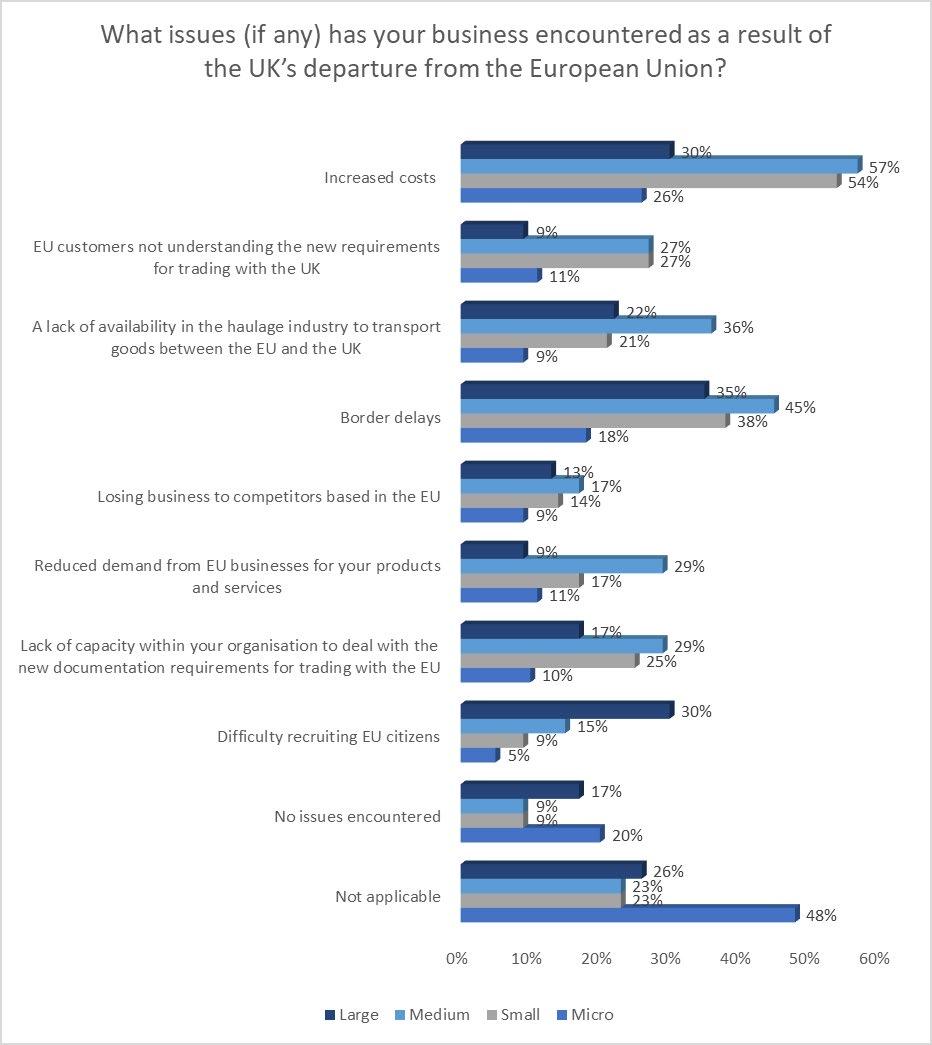
“As we purchase equipment from the UK subsidiary of European Manufacturers it is becoming difficult to get products on time. Costs have increased, transport and border delays have caused issues with deliveries and stock availability is getting worse. Internet sales companies are proving difficult as they drive the price down to limits that are not sustainable.”
“Being involved in Transportation. There has been a big rise in paperwork and also a lack of knowledge is evident throughout the UK and Europe”.
“My clients are not purchasing off us as all available budget is going into getting more staff to manage the increase in paperwork. The logistics industry is crippled by this. “
“Obtaining spares for plant and trucks that need to come from the EU has been much slower (2-5 days extra) that before Brexit. We sold waste cardboard, paper and plastics to the near continent; Brexit has made the margins far too tight to remain competitive.”
Businesses were asked what action/s (if any) had they taken to address any issues they have encountered following the end of the Brexit transition period. The overall results were as follows:
•18% of respondents had sourced new or additional suppliers
•10% of firms had switched to using UK based suppliers
•13% reported that they had diversified their supply chain
•12% had changed the method of transportation thy use for moving goods between the UK and the EU
•20% had incurred higher costs and passed them on to their customers
•17% had incurred higher costs and not passed them on to their customers
•12% reported that they had stockpiled goods
•6% of respondents had expanded in or entered non-EU markets
•4% of firms had moved or established business operations in the EU
•9% of businesses had recruited staff from the UK
•5% of respondents had not taken any of the above actions
The biggest issues that UK businesses have faced since the end of the transition period is the increased costs involved in trading with the EU. One in five respondents had incurred higher costs and had responded by passing them on to their customers. 17% of businesses had experienced increased costs and made the decision not to pass this on to their customers.

While some businesses may have taken the increased costs on, at least initially in the short term, for many it will not be sustainable in the long-term, especially at a time when many businesses have been severely impacted by the global pandemic and are suffering severe cash flow issues.
There is also the added factor that many UK government support schemes, set up to help businesses impacted by Coronavirus restrictions, are yet to end. This may be masking the true impact of the pandemic and some businesses that have taken on the increased costs involved with trading with the EU may find it is no longer an option as government support schemes start to wind down.
Equally those firms who have passed on the costs to their customers risk pricing themselves out of the market.
More than one in three manufacturers (34%) had responded to the new trading arrangements with the EU by sourcing new or additional suppliers. Switching to using UK based suppliers is one of the ways in which firms are attempting to navigate the new bureaucracy and costs associated with trading with the EU. However, this is not a viable option for some firms with no alternate supplier in the UK available to them. 17% of manufacturing firms have looked to diversify their supply chains in response to the end of the transition period as a way of minimising potential problems arising from Brexit such as being able to fulfil orders on time.

9% of medium sized firms had responded to the new post- Brexit trading conditions by expanding into or entering non-EU markets. This is higher than the average across all respondents which stands at 6%. The proportion of smaller businesses reporting that they had expanded into non-EU markets was also higher than the proportion of larger firms but given the low number of responses from larger businesses we are unable to draw an accurate conclusion from it in that respect.
6% of the small businesses surveyed had moved some of their business operations to the EU as a way of addressing some of the issues they have faced since the end of the transition period at the start of the year. This is slightly higher than the 4% recorded across all respondents.
While moving their business operations to the EU enables firms to avoid paying double duty on goods imported to the UK from outside the EU, it brings with it additional costs that further eat into businesses margins such as rent and other overheads.

“We have been impacted by the lack of skilled workers coming from the EU and now only recruit UK nationals which is more than a challenge. Material suppliers increasing their prices dramatically, some by double digit percentage, which I can’t pass onto our clients due to the types of contracts we have in place.”
“We are trading on Amazon to Spain, France and Italy. but since January have received no orders at all. VAT and shipping costs are too high. We used to buy fabric from France, but with all extra costs we have now sourced new UK suppliers.”
“We really struggled with delays of goods in January and February and have tried to source more within the UK now. Our enquiries from the EU have also reduced significantly”
“We anticipated problems and opened offices in the EU to mitigate against the worst of this. It a shame it moves business away from Britain, and it has been expensive. But it was necessary.”
Businesses were also asked about their future intentions in relation to trading with the EU, both in the short-term and the long-term. The overall response was as follows:
60% of firms plan to maintain existing activity with the EU in the short-term (0-2 years) compared to half of businesses over the long-term. The proportion of businesses expecting to increase their activity in the EU market was higher over the long-term than the short-term with nearly a third of businesses expecting their activity to increase (12% significantly increase activity; 20% slightly increase) over the long-term compared to 19% in the short-term (6% significantly increase activity; 13% slightly increase activity).
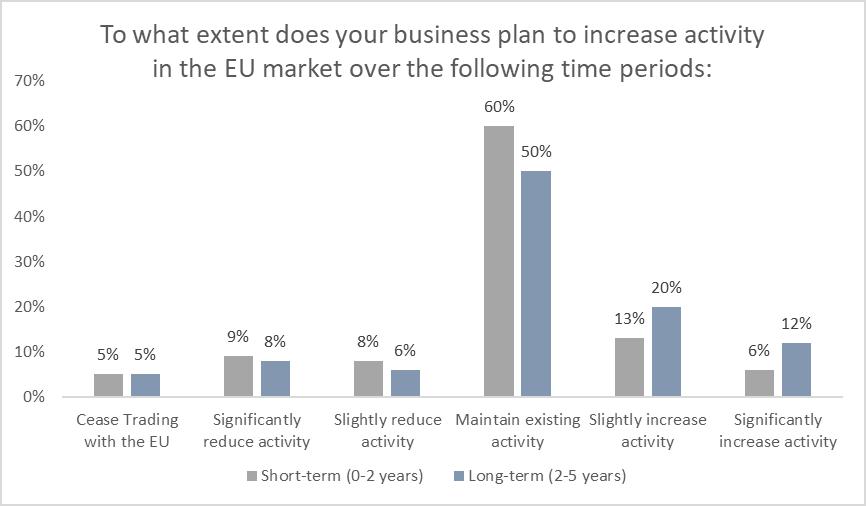
Overall, only 5% of businesses expect to cease trading with the EU in both the short-term and the longterm.
A higher proportion of manufacturing firms expect to reduce their activity (in both the short-term and the long-term) compared to services sector firms. 15% of manufacturers responded that they were planning to significantly reduce activity during the next 2 years with 10% of firms looking to slightly reduce their EU activity. By comparison, 6% of service sector firms expect to significantly reduce their activity and 7% plan to slightly reduce their activity in the EU market over the course of the next 2 years.
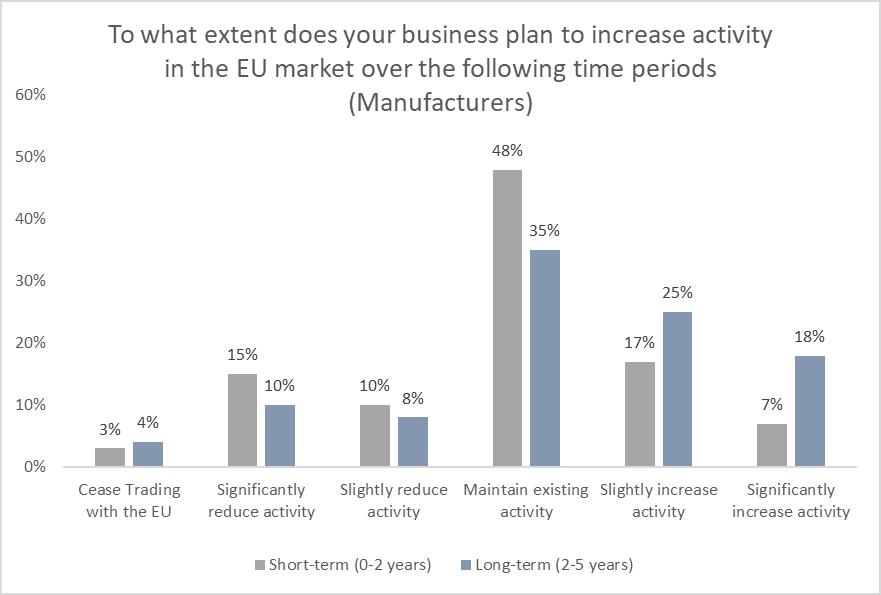
Over the long-term, 18% of manufacturers plan to reduce their activity in the EU market in the next 2-5 years (10% significantly reduce activity; 8% slightly reduce activity) compared to 11% of services firms (6% significantly reduce activity; 5% slightly reduce activity).
Nearly one in four small businesses (23%) expect to increase their activity to a certain extent in the EU market over the next 2 years compared to 17% of micro firms and medium sized firms respectively.

22% of medium sized firms anticipate that they will reduce their activity in the EU market to a certain extent over the next 2 years compared to 20% of small businesses and 13% of micro sized firms.

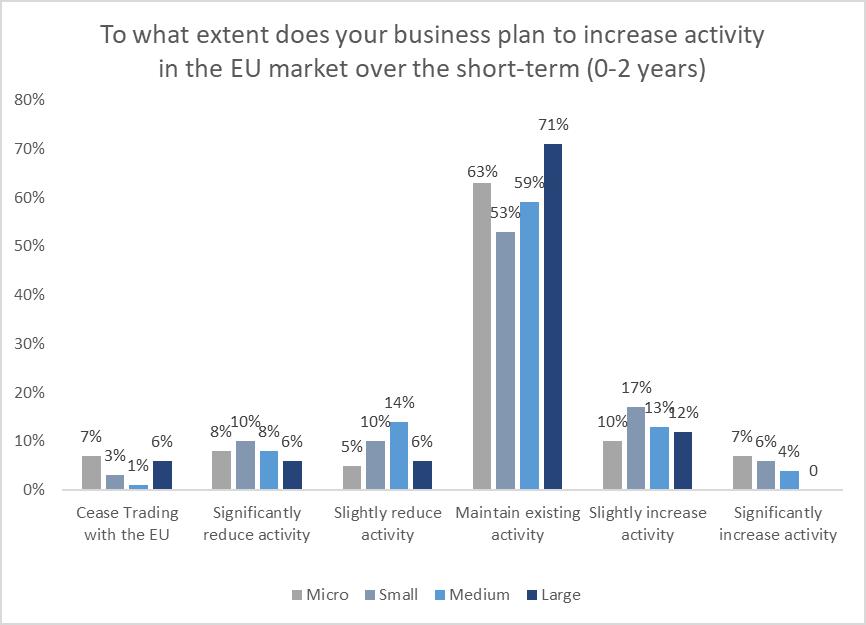
55% of micro firms plan to maintain existing activity in the EU market over the long-term (2-5 years) compared to 47% of small businesses and 45% of medium sized firms. 7% of micro-sized firms believe they will cease trading with the EU over the course of the next 2-5 years compared to 3% of small businesses and 1% of medium sized firms.
Respondents were asked the following free text questions to help expand on their answers given to the questions above:
The Chambers of Commerce are looking to understand how businesses are being impacted by and responding to the end of the Brexit transition period:
5.How are businesses responding to the end of the Brexit Transition period?
•What has been your business’ experience of Brexit: are there clear challenges and/or opportunities?
•What support (if any) would you like to see from the government to help your business adapt to the new trading environment with the EU?
The main challenges that most firms are facing are in relation to the additional costs incurred when trading with the EU as well as the new paperwork requirements. Traders also mentioned that there was a less availability and higher costs involved when trying to secure certain products. The EU has also become a much harder area to win work for a number of firms and businesses also raised their concerns around the increasing costs of raw materials, which was likely to get worse when full UK import controls are introduced later this year. Other areas in which businesses had highlighted difficulties were Rules of Origin and the complexity of complying with dual regulatory regimes which is particularly onerous for SMEs. The Northern Ireland Border was a major issue raised by several businesses that took part in the survey.
A significant number of businesses also mentioned the severe delays on goods movements between the UK and the EU along with the increased costs associated in transporting the goods due to couriers introducing Brexit surcharges. Several firms mentioned that hauliers were increasingly stretched and unable (and at times unwilling to collect from Europe due to the increased bureaucracy) to take on new business.
This is subsequently causing issues for firms who are finding it increasingly difficult to get products on time and stock availability was getting worse for some firms. Some firms have responded by switching to UK based suppliers due to the increased costs of transport. Respondents also touched upon the fact that carriers seemed to have different ways of carrying out the new paperwork requirements which makes it far more difficult for firms to navigate as there is no standardisation at the moment. Businesses have also experienced border crossing issues in terms of getting their products through customs in certain EU countries and as a result have circumvented this issue by exporting their goods though other EU countries to reach their destination.
Several firms mentioned that they had found the existing government support insufficient in terms of helping them to adapt to the new trading requirements with the EU. The language used on the gov. uk website was not very clear at times and businesses had difficulty understanding what was required of them. Respondents also mentioned the need for open answers from the Government on simple questions. There was a sense that firms are always told to check on the government web site, but it was very hard to find specific information outside of simple import/export services. One business commented on the lack of information available on how they could export to the EU where digital services, rather than physical products were concerned. The business still felt unclear on the matter and felt that the government could have done more to help services sector firms including supplying each business owner with an information pack clearly explaining what they need to do.
A significant number of respondents spoke about the need for additional government support to help firms deal with the new customs aspects of Brexit. Some firms mentioned the need for further grant funding to be made available to them to be able to access external support to advise them on the new training requirements for trading with the EU and purchase new equipment. Others called for tax relief where firms are encountering additional costs associated with the new post-Brexit trading environment with the EU. One firm said that the government should provide free at point of delivery training courses to help firms understand the documentation requirements for moving goods between UK and EU.
“No benefits encountered so far in relation to Brexit. Higher costs to customers as a result of duties and fees from manufacturers. Deliveries that used to come in and out of the EU used to take 1-2 working days at most, now at 4 working days. Export orders getting returned or stuck for weeks at customs. International clients are buying from EU-based competitors and circulating large orders within the EU, leaving us with the smaller UK-only orders. We also now have to buy non-EU-made goods from EU suppliers for delivery within Europe to avoid tariffs, so UK is losing out directly on that income. We have no choice but to do this in order to remain competitive.”
“Brexit went smoother than expected. It has caused additional costs in some instances but generally all is OK. Covid and the subsequent difficulties that has caused to transport and travel in and out of Europe has caused far more problems than Brexit.”
“Still ongoing disruption at borders. Reliability of carriers is a problem timeliness and losing product, the challenge is when we don’t move a full vehicle and our product is moved with other organisations product where the information, they provide is not always correct and this holds up the complete shipment”.
“We are an EU company, so Brexit has made the company invest in a larger facility within the UK. Any help the government can do to improve good to flow between the UK and EU with be helpful.”
“Brexit has been a disaster, too many delays and not enough clear information on changes. Funding for staff training and advice would be a great help. Advice from accountants is very expensive.”
“We lost over 7% of highly skilled staff who left the UK. Approx. half were EU citizens returning and half were born in UK but felt the country was no longer for them. We cannot CE mark our products so had to set up EU operation at significant cost. Paperwork has increased substantially to import our raw materials and export our goods.”
“Brexit has caused significant difficulties and delays in supplying our goods to the EU. We have exported around the world for many years and exporting to the EU is significantly more difficult than many other countries. There are delays at customs and customers are finding it difficult to arrange customs clearance so that they can receive their goods. We have increased costs from duties on goods we import which luckily are few as we mostly source our components from the UK. However, these imports are taking significantly longer and we are having to order much earlier.”
“Brexit has had no effect on us at all. Only issue was lack of clarity around VAT/reverse charging for services. The government provided lots of information on goods import/export but not much at all for services, and we really had to dig to figure out how to handle this.”
“Very difficult to know for sure given lack of normal trading conditions during the pandemic, but the main concerns would be loss of UK tour dates due to artist promoters sticking to EU options and also potentially less desire for international conference and exhibitions organisers/audiences to be in the UK.”
“We have only been affected by the withdrawal of EU funding in 2023. The government have plans to introduce replacement funding (the Shared Prosperity Fund) in 2022 but details are still limited.”
“For us as a Business, Brexit has been an unmitigated disaster. Exporting to a wide customer base has become significantly more complex and expensive. The UK Government should stop spending so much effort on spinning positive news about Brexit, be up front about the major issues and work with all areas of business and commerce to alleviate the problems.”
Rajdeep Kandola Head of Policy Greater Birmingham Chambers of Commerce R.kandola@birmingham-chamber.com

